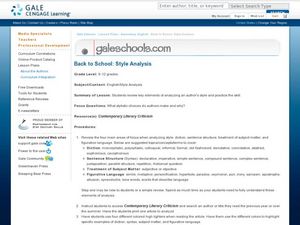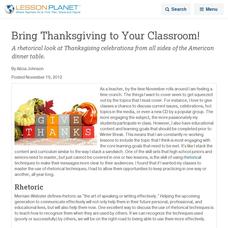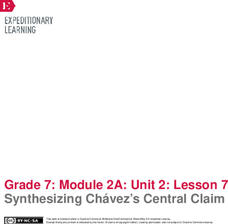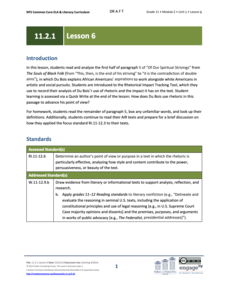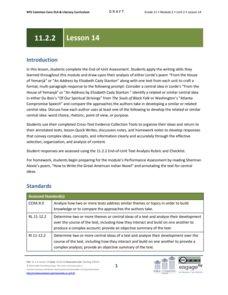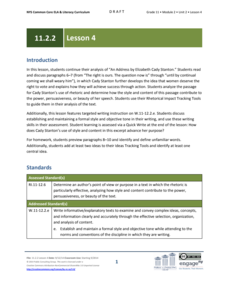Penguin Books
A Teacher's Guide to the Signet Classic Edition of The Crucible by Arthur Miller
A 20-page guide is a must-have for any instructor, seasoned veteran, or first year-teacher, using Arthur Miller's The Crucible as an anchor text. The guide begins with extensive background information about Miller and the McCarthy era...
Utah Education Network (UEN)
Classical Appeals and War Speeches
Discuss classical appeals of rhetoric through the speeches of Winston Churchill and FDR. Learners read, annotate, and analyze the speeches by the men before using a graphic organizer to track the use of ethos, pathos, and logos.
Curated OER
Back to School: Style Analysis
Jump back into expository writing and analysis at the start of a new school year! Start with a review of an authors' stylistic choices in diction, syntax, treatment of subject matter, and figurative language. Writers choose a text to...
Curated OER
Thanksgiving in America
A rhetorical look at Thanksgiving celebrations from all sides of the American dinner table.
K20 LEARN
It's All About Balance! Parallel Structure
I came, I saw, I conquered! Parallel structure, employed by writers even before Julius Caesar, is the focus of a lesson that teaches young writers the power of this rhetorical device. Class members analyze speeches by Dr. Martin Luther...
Encyclopedia Britannica
Candidate Flip-Flop or Evolution?
Beware political rhetoric! Connotation is everything! Groups select a presidential candidate and investigate how the candidate's position has changed on a specific issue. After analyzing the situation, the group determines whether they...
EngageNY
Synthesizing Chávez’s Central Claim
Class members play an interactive game, matching strips of paper containing rhetorical devices with examples from César Chávez use rhetoric in his 1984 speech, "Address to the Commonwealth Club of California." Next, partners discuss...
EngageNY
Reading Closely and Introducing Rhetoric Toolbox: Unions as Agents of Change—Part 1
Scholars explore the question of whether labor unions are the agents of change as they continue reading César Chávez's 1984 speech, "Address to the Commonwealth Club of California." They discuss rhetoric in Chávez's speech and discover...
Great Books Foundation
I Shall Not Beg for My Rights
An excerpt from Henry MacNeal Turner's address to the Georgia legislature provides class members with an opportunity to develop their literary analysis skills. Prompted by the provided factual, evaluative, and interpretive questions,...
Literacy Design Collaborative
The Art of Persuasion: How Rhetorical Devices Influence Audiences
Scholars analyze a variety of text to identify the development of claims and persuasive techniques writers use. In each text, pupils determine the argument and the persuasive techniques and complete a task introduction worksheet. The...
Literacy Design Collaborative
Rhetorical Analysis for Pre-AP English
Scholars closely analyze the use of rhetorical strategies in several model texts. They work in groups to annotate the text identifying rhetorical elements, and to complete a Rhetorical Analysis chart and guided reading worksheet....
National Woman's History Museum
The Power of Words and Activism: Susan B. Anthony
Where have all the activists gone? Class members compare 21st-century activism with the suffrage movement and the work of Susan B. Anthony. They begin by examining Anthony's biography and speeches to find evidence that her words and...
Literacy Design Collaborative
Rhetorical Analysis: A Modest Proposal
Scholars read Jonathan Swift's A Modest Proposal before writing essays to analyze the use of rhetorical devices in the text. Essay writing begins by underlining key words in the writing prompt and discussing the prompt with partners....
EngageNY
Grade 11 ELA Module 2: Unit 1, Lesson 26
Add all of the pieces to complete the puzzle. Scholars apply their knowledge from the past 25 lessons to an end-of-unit writing assignment. Pupils write multi-paragraph essays comparing the author's point of view and use of rhetoric in...
EngageNY
Grade 11 ELA Module 2: Unit 1, Lesson 22
Say precisely what you mean. Scholars analyze the importance of Washington's precise language in paragraphs eight and nine of the "Atlanta Compromise" speech. They interpret his figurative language and add it to their Idea Tracking...
EngageNY
Grade 11 ELA Module 2: Unit 1, Lesson 21
Is there power in persuasion? After reading paragraphs six and seven of Booker T. Washington's "Atlanta Compromise" speech, learners look at how Washington uses rhetoric and carefully planned word choice to add to the persuasiveness of...
EngageNY
Grade 11 ELA Module 2: Unit 1, Lesson 19
Scholars look at paragraphs two and three in the "Atlanta Compromise" speech. They analyze how Washington uses a story about a ship lost at sea and rhetorical devices to develop his point of view. After class discussion and completing...
EngageNY
Grade 11 ELA Module 2: Unit 1, Lesson 17
Scholars enter the midpoint of the unit and connect all the previous 16 lessons about the text "Of Our Spiritual Strivings." They complete a Mid-Unit Assessment that requires a multi-paragraph response to a writing prompt.
EngageNY
Grade 11 ELA Module 2: Unit 1, Lesson 8
Was freedom really free? Scholars analyze paragraphs six and seven of Du Bois's chapter "Of Our Spiritual Strivings." They look at how the author uses rhetoric to strengthen his point of view about freedom. Learners complete a Rhetorical...
EngageNY
Grade 11 ELA Module 2: Unit 1, Lesson 6
Take a look at the world through my eyes. Readers begin to understand the techniques Du Bois uses to advance his point of view in the fifth paragraph of the chapter "Of Our Spiritual Strivings." They complete a Rhetorical Impact Tracking...
EngageNY
Grade 11 ELA Module 2: Unit 2, Lesson 14
It's time to put it all together! Using the resource, scholars complete an end-of-unit assessment. They write a multi-paragraph essay comparing Audre Lorde's "From the House of Yemanjá" or "An Address by Elizabeth Cady Stanton" to...
EngageNY
Grade 11 ELA Module 2: Unit 2, Lesson 7
Joan of Arc, Mother Teresa, Rosa Parks ... many inspirational women have paved the way for future generations, and Elizabeth Cady Stanton is no exception. Scholars continue reading and analyzing "An Address by Elizabeth Cady Stanton."...
EngageNY
Grade 11 ELA Module 2: Unit 2, Lesson 4
How does style contribute to the power and persuasiveness of a speech? With the question in mind, scholars continue reading "An Address by Elizabeth Cady Stanton." They complete a Rhetorical Impact Tracking Tool to guide them in their...
EngageNY
Grade 11 ELA Module 1: Unit 3, Lesson 3
Virginia Woolf didn't believe a woman could have written Shakespeare's works. Using the resource, scholars engage in a silent discussion to analyze how Woolf uses rhetoric to convey her point of view in A Room of One's Own. Pupils write...




